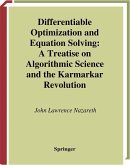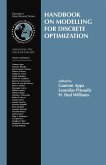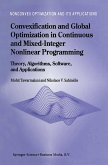There are numerous books on Multiple Criteria Decision Making. Soft Computing for Complex Multiple Criteria Decision Making concentrates on providing technical (meaning formal, mathematical, algorithmical) tools to make the user of Multiple Criteria Decision Making methodologies independent of bulky optimization computations. These bulky computations up to now have been a necessary, but limiting, characteristic of interactive MCDM methodologies and algorithms. This book removes these limitations of MCDM problems by reducing a problem's computational complexity. The book systematically applies the approximate - soft - treatments to major MCDM solving methodologies. As a result, it provides a wider and more functional general framework for presenting, teaching, implementing and applying a wide range of MCDM methodologies. The book seeks to provide a stimulus for a broader development and application of MCDM methods.
"Daprima importa sappere di che cosa si tratta." ("The ?rst thing is to know what the talk is about".) Attributed to Vilfredo Pareto. This book results from my continuous and deep interest in multiple criteria decision making (MCDM). Eleven years ago I wrote in my p- vious monograph: "This work results from my interest in the ?eld of vector optimization. I stumbled ?rst upon this subject in 1982 [ ... ]. I was attracted then by a gap between vector optimization used to serve as a formal model for multiple objective decision problems and the - cision problems themselves, the gap nonexistent in scalar optimization. Roughly speaking, vector optimization provides methods for ranking - cisions according to a partial order whereas decision making requires a linear ordering of decisions." This declaration is still valid and nothing needs to be changed. To be more speci?c, this book is a fruit of my dissatisfaction with the current state-of-the-art of MCDM. MCDM is a branch of science, whose declared ultimate goal is to provide practical tools. However, we cannot say, and this is regrettable, that all present MCDM methods and algorithms are in popular use by those who make complex decisions and for that purpose are in need of methodological or computational support.
Hinweis: Dieser Artikel kann nur an eine deutsche Lieferadresse ausgeliefert werden.
"Daprima importa sappere di che cosa si tratta." ("The ?rst thing is to know what the talk is about".) Attributed to Vilfredo Pareto. This book results from my continuous and deep interest in multiple criteria decision making (MCDM). Eleven years ago I wrote in my p- vious monograph: "This work results from my interest in the ?eld of vector optimization. I stumbled ?rst upon this subject in 1982 [ ... ]. I was attracted then by a gap between vector optimization used to serve as a formal model for multiple objective decision problems and the - cision problems themselves, the gap nonexistent in scalar optimization. Roughly speaking, vector optimization provides methods for ranking - cisions according to a partial order whereas decision making requires a linear ordering of decisions." This declaration is still valid and nothing needs to be changed. To be more speci?c, this book is a fruit of my dissatisfaction with the current state-of-the-art of MCDM. MCDM is a branch of science, whose declared ultimate goal is to provide practical tools. However, we cannot say, and this is regrettable, that all present MCDM methods and algorithms are in popular use by those who make complex decisions and for that purpose are in need of methodological or computational support.
Hinweis: Dieser Artikel kann nur an eine deutsche Lieferadresse ausgeliefert werden.
From the reviews: "The book deals with several topics of multicriteria analysis (MCA). ... Each chapter has annotated references which provide good guidelines for further reading. The bibliography covers the topics presented in the book well. ... The book therefore can be recommended ... for both researchers and practitioners concerned with MCA methods. Readers interested in specific issues related to the topics covered by the book may enjoy the way in which the author shares his thoughts and experience." (Marek Makowski, Mathematical Reviews, Issue 2008 g) "Soft Computing for Complex Multiple Criteria Decision Making (MCDM) is the 85th volume in the International Series in Operations Research & Management Science. The book ... is aimed at academics and other researchers, doctoral students, and sophisticated users ... . Overall, the book describes technical concepts clearly and presents these concepts along with clarifying figures and examples. ... I also recommend this book to academics as an introduction to the field ... ." (Yael Grushka-Cockayne, Interfaces, Vol. 37 (6), 2007)








